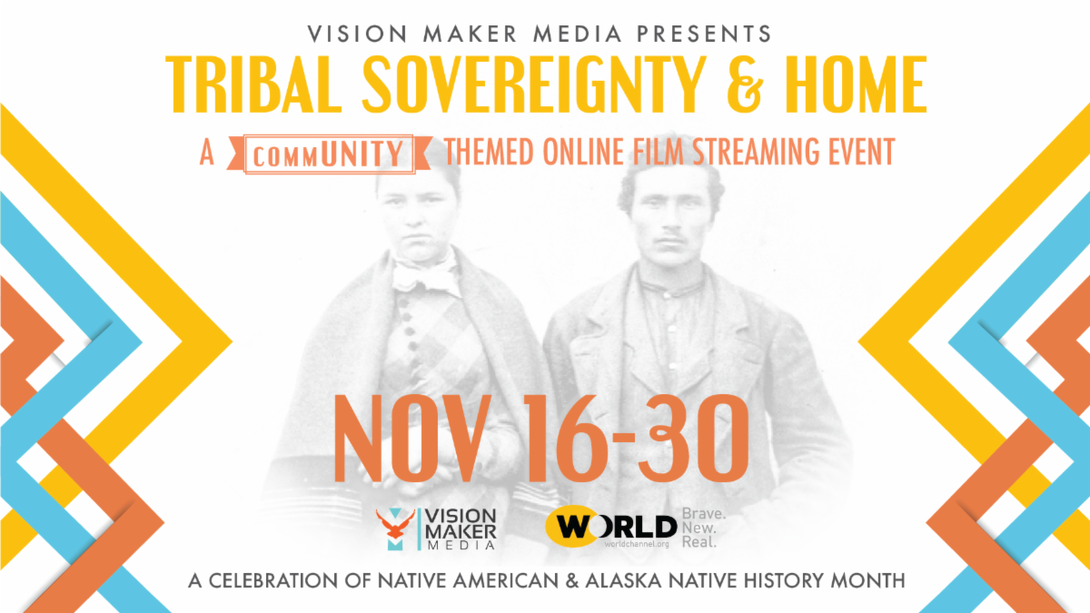
In celebration of Native American and Alaska Native Heritage Month, Vision Maker Media in partnership with the WORLD Channel presents “Tribal Sovereignty and Home,” an online film streaming event Nov.16- 30. “Tribal Sovereignty and Home” is free and open to the public for online streaming.
“Tribal Sovereignty and Home” showcases Native American topics that have long resonated within Native communities in the United States, such as Native Nation sovereignty, empowerment, history and healing. The curated selection includes six films that further educate audiences about the histories, battles and accomplishments of Native Americans. Two documentaries focus on Indian Child Welfare and Native Americans’ contributions to American music, while the remaining documentaries center on activism, civil rights, environment and social justice stories from four different Native communities.
This event features the Emmy Award-winning film “Dawnland,” about removing Native children from their homes, and a Vision Maker Media newly produced “Osage Murders” about how the Osage became known as the wealthiest people in the world and the illegal practices used to rob them. Also featured is “Rumble,” a 2020 Emmy Award-nominated documentary, about Native musicians who rocked the world and the role of Native Americans in popular music history.
“Now more than ever in this divided time, we need communities to join together, learn more about each other, and by sharing story and knowledge we can. Every year, Native American and Alaska Native Heritage Month focuses on crucial Native American events and is an opportunity to educate the world about Native American history and culture, especially, by bringing Native storytellers to the forefront of the conversation,” Francene Blythe-Lewis, Executive Director of Vision Maker Media, said.
At 7 p.m. Nov. 17, Vision Maker Media with support of WORLD Channel will host “Tribal Sovereignty and Home,” a special live stream panel discussion with Dennis Bowen Sr., former president of the Seneca Nation; Jim Gray, former principal chief of the Osage Nation; Misty Frazier, executive director of the Nebraska Indian Child Welfare Coalition; and Laura L. Harris, executive director and CEO of Americans for Indian Opportunity. The panel will be moderated by investigative journalist about Indigenous rights and social justices worldwide and media critic, Jenni Monet (Laguna Pueblo).
Topics to be explored include the Native foster care system, environment, racial injustice, tribal sovereignty, women empowerment and native leadership. The panelists will speak about the larger context of these topics in the films, and what is currently happening in Indian country.
The entire line-up of films and the recorded panel discussion will be showcased on visionmakermedia.org, YouTube, Vimeo and Facebook for two weeks, running Nov. 16-30. Viewers will be able to stream the films and panel at their convenience any time during the two-week period.
Film descriptions
“Dawnland” (2018, USA, 86 min.) 2019 Emmy® Award Winner, 2019 Emmy® Nomination for Outstanding Music
For decades, child welfare authorities have been removing Native American children from their homes to “save them from being Indian.” In Maine, the first official Truth and Reconciliation Commission in the United States begins a historic investigation. “Dawnland” goes behind-the-scenes as this historic body grapples with difficult truths, redefines reconciliation, and charts a new course for tribal relations.
“For the Rights of All: Ending Jim Crow in Alaska” (2009, USA, 57 min.)
“For the Rights of All: Ending Jim Crow in Alaska” tells the story of an extraordinary Alaskan woman who becomes an unforeseen hero in the fight for civil rights. Elizabeth Peratrovich — a young, unassuming Tlingit Indian mother of three — testified before the Alaska Territorial Senate in 1945 and swayed the floor vote with her compelling testimony in favor of the passage of the Anti-Discrimination Act, the first civil rights bill passed in the United States since the Civil War.
“LaDonna Harris: Indian 101” (2014, USA, 63 min.)
“LaDonna Harris: Indian 101” chronicles the life of Comanche activist and national civil rights leader LaDonna Harris and her influences in Native and mainstream American history. Harris’s activism began in Oklahoma, fighting segregation. She continued her work in Washington, D.C., where she helped to introduce landmark programs and legislation that included tribal land claims, improving education and healthcare for Native Americans, ending job discrimination against women, and protecting environmental resources for tribes. Her more recent contemporary work to strengthen and rebuild Indigenous communities and train emerging new Native leaders around the world is also highlighted.
“Lake of Betrayal” (2017, USA, 56 min.)
“Lake of Betrayal” explores the history of Kinzua Dam on the Allegheny River in Pennsylvania and its impact on the Seneca Nation of Indians. Completed in 1965, it was originally proposed to help mitigate flooding in Pittsburgh. Yet, two hundred miles downriver, a 27-mile reservoir formed and inundated vast tracts of the Seneca Indians’ ancestral lands, forcing their removal in breach of the United States’ oldest treaty. The film looks at the Seneca Nation’s fight to protect its sovereignty against the U.S. government’s Indian termination policy and overwhelming political and economic forces following WWII.
“Rumble: The Indians Who Rocked the World” (2017, Canada, 102 min.) Emmy Award nomination for Outstanding Arts and Culture Documentary
“Rumble: The Indians Who Rocked the World” brings to light a profound and missing chapter in the history of American music—the Indigenous influence. Featuring music icons Charley Patton, Mildred Bailey, Link Wray, Jimi Hendrix, Jesse Ed Davis, Buffy Sainte-Marie, Robbie Robertson, Randy Castillo, and Taboo, “Rumble” shows how these pioneering Native musicians helped shape the soundtracks of our lives.
“Osage Murders” (2020, USA, 14 min.), world-premiere screening
“The Osage Murders,” tells the story of how the Osage became known as the wealthiest people in the world during an oil boom on their reservation and the practices used to rob them. The boom took place in the first part of the twentieth century, leaving scars still affecting families today. Racist attitudes supported by government policies at all levels made it possible to use any means to separate the Osage from their money. Blind eyes turned away from criminal practices by lawyers, merchants and bankers. Guardians were appointed because of the racist belief that Indians could not be trusted to spend their money wisely. Many of these guardians took advantage of their position. Marrying an Osage with the intent to murder for the inheritance was an all too common practice. Yet, the Osage proudly survive today.
For more information about the festival, contact Alyssa Ranard at 402-472-8607.







